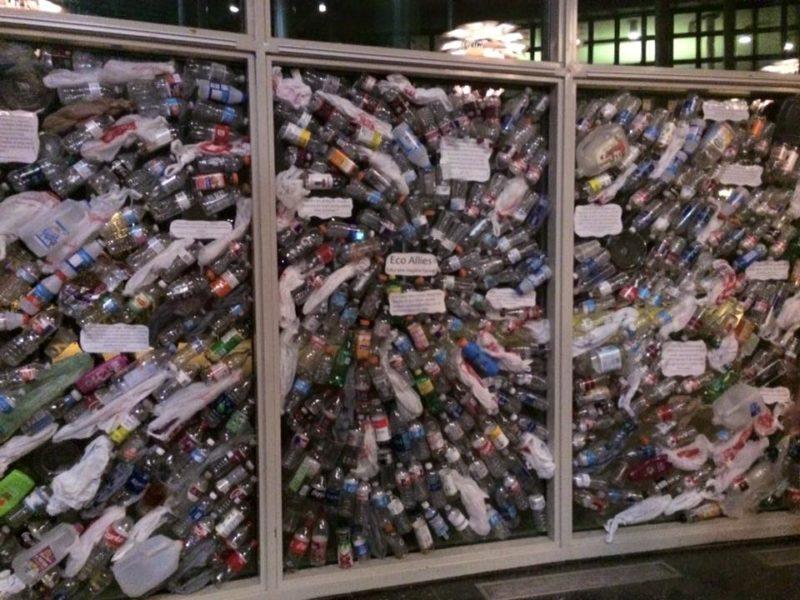A sculpture made by the Eco Allies, swirling on the windows of Coates, served as a platform to show the impact of single-use plastics on their surroundings.
The Eco Allies aimed to bring awareness about recycling on campus and the effects of improperly disposing of single-use plastics by creating the sculpture.
“The purpose of doing this is to hopefully get the university to notice it and just stop for a second or two in their day and think about “˜What’s plastic in my life?'” Kristen Rundstein, junior engineering science major, said. “We’re really targeting single-use plastics, like you don’t need a plastic shopping bag, you don’t need a plastic water bottle. You can get a reusable one, for both of those.”
In addition to catching attention and provoking thought, the arrangement of single-use plastics gathered mainly from recycling bins around campus was made to serve as a distraction for those who avoid thinking about the effects recycling may have.
“We tried to make it pretty, but it doesn’t have to be pretty because that’s the whole thing, it’s kind of ugly,” said Sam Simoneau, senior geoscience major and co-president of Eco Allies “You don’t want to see this ugly mess in front of you. It’s supposed to encourage you to use less single-use plastic.”
This structure marks the second time Eco Allies has created a plastic display in Coates, as they created the same sculpture last year.
“We started doing it last semester,” Rundstein said. “We thought about doing it last fall and we ran out of time. We were going to do it, then it fell through. That spring semester, last semester, we did it for the first time on the windows, and I felt like that was really successful.”
Inspired by a similar image that she saw on the internet, Lindsey Yazbek, senior environmental studies and geosciences major and co-president of Eco Allies, adapted the concept of the display she saw into an approachable idea of a way to call attention to the countless issues and consequences that single-use plastics may cause when they are not properly disposed of.
“I just presented it to the club, and then the club was actually pretty excited about what I showed them,” Yazbek said.
In order to implement her plan, Yazbek and the club had to go through administrative and logistical steps, including getting a location approved by Trinity, defining how long it would be up and describing what it would look like to a panel. However, because it had already been done last semester, the sculpture process for this semester was much more efficient
Though this project was approved and was revived for another semester based on previous demonstrations and plans, executing projects for the Eco Allies isn’t always without some form of controversy.
“It’s a fine line we walk. As a club, anytime we try to do campus outreach or bring awareness to a certain topic, we have to try to bring awareness without angering the entire campus,” Simoneau said. “This is an approach we’re taking to do less singling out. Us as a campus, we’re just doing this poorly. We really aren’t saying that you are as a specific person.”
This year, Eco Allies was pleased to learn that their sculpture project experienced a modest, but enthusiastic response from most students and faculty members who observed it.
“In the past we’ve had a little bit of an issue getting support from people in the club, it’s been a lot of the officers doing work, so for me a big part of the sculpture was actually seeing our club come together,” Yazbek said “Different people bringing different bottles. That was cool to see different parts of our club, and even some new people, come and help us out. That was really exciting to see that people were excited about it.”
The single-use plastic sculpture isn’t also without any flaws. A problem the display has encountered countless times is the bottles and containers falling off the window after its construction was finally completed by the organization.
There has had to be some adjustments and fixing since the original installation of the display of the recycled materials. Nevertheless, the falling pieces haven’t been viewed as a complete set back by any of the members of the club; they are actually amused by it.
“I think that adds an interesting dimension to it,” Simoneau said. “It just adds another distraction, like an unplanned addition that overall adds to the distraction.”
Overall, the club hopes that the sculpture inspires a change in the attitudes, actions and habits of Trinity’s faculty members and students when it comes to their recycling trends, while also spreading awareness about the benefits of recycling common products.
“A lot of times people use excuses, “˜Oh it’s fine, I’ll recycle it.’ One of our biggest messages from Eco Allies is that, while recycling is great, the best thing you can really do is just reduce your use,” Yazbek said. “Reduce reuse recycle. It’s in that order for a reason. And you’re supposed to follow it in that order. Mainly the excuse I always hear people say is “˜Yeah, yeah I recycle, I recycle.’ Well you could’ve just not bought it in the first place, that’s actually the better option.”
The single-use plastic sculpture is only one step of many planned by Eco Allies towards improving the established recycling efforts accessible on campus.
“I think that a lot of people on campus like to think they’re environmentalists or that they are good stewards of the earth,” Yazbek said, “But, in actuality, we’re not doing as good as we think we are.”
The Eco Allies are continuing to work on the structure of their club; they currently have flexible meetings every other Tuesday in Woodlawn.
For more information about joining Eco Allies or about recycling efforts on campus, students and staff members are encouraged to reach out to co-president Sam Simoneau at [email protected].







